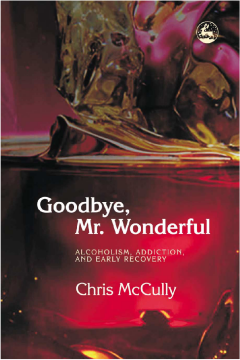
Additional Information
Book Details
Abstract
Alcohol thought Chris McCully was Mr. Wonderful. When Chris was drinking, he sometimes thought so too - Mr. Generous, Mr. Witty and Charming, Mr. Champagne. But there are other labels - 'chronic alcoholic' (all over the medical notes); 'high risk offender' (in the court record). Goodbye, Mr. Wonderful gives a detailed account of the early stages of recovery from alcoholism. From his admittance into hospital to his life as a writer in the Netherlands, McCully offers a detailed and often analytical reflection on what it feels like to be a recovering alcoholic. There is no cure for alcoholism, but there is daily management, and there is hope. This is a book for anyone who wishes to understand, or wishes that someone else could understand, the process of healing from addiction.
This might be the best recovery autobiography that I have read, thanks to thoughts and reflections penned by the author as a stream of consciousness in an intermittent diary of his first three years free of alcohol dependency…Like most writers, McCully is voraciously questioning about what has shaped his world, and people like him. He searches websites and shares highlights of information. He garners advice from professionals and peers in recovery, and peppers them with snippets about alcoholism overheard on the radio or scanned in newspapers. "I am trying to learn to be happy and I feel very much better," he concludes. We get a picture of the person he has become - and that is someone I, for one, would like to meet.
Addiction Today
Chris McCully is and always will be an alcoholic, and today he is in recovery. He is married and lives in Amsterdam. He is a freelance writer and an academic. He goes fishing as often as possible. There is no causal or other connection between these statements.
Overall, for professionals seeking to gain an insight into the psych of the alcoholic, this is a book well worth reading.
Community Practitioner
Praise for the book:
'It was like the best kind of company, like having a recovery meeting available every day.'
A reader
Table of Contents
| Section Title | Page | Action | Price |
|---|---|---|---|
| Prelims - Stepping Forward (Title Page, Copyright Information, Contents, Abbreviations, Glossary, Dedication Page, Acknowledgements, Forward, Preface) | |||
| 1. PART 1 - CHILDREN AND YOUNG PEOPLE'S PARTICIPATION: THE STARTING-POINT | |||
| Victoria Johnson and Edda Ivan-Smith | |||
| 2. PART 2 - BUILDING BLOCKS AND ETHICAL DILEMMAS | |||
| Victoria Johnson, Emmanuelle Abrioux, Roger Hart, Sarah McNeill, Jonathan Blagbrough, Claire O'Kane, Melinda Swift and Eileen Adams | |||
| 3. PART 3 - HOW TO: THE PROCESS | |||
| Gill Gordon, Charity Manyau, Mahfuza Haque, Thabang Ngcozela, Joachim Theis, Alice Lamptey, Julian Faulkner, Joanna Hill, Rachel Hinton, Rachel Barker, Andy Inglis and Ernesto Cloma | |||
| 4. PART 4 - CULTURE: ATTITUDES AND PERSPECTIVES | |||
| Pat Pridmore, David Stevens, Martin Woohead, Kate Harrison, Christiana Obeng, Barnabas Otaala, Safa Halasah and Rachel Carnegie | |||
| 5. PART 5 - CHILDREN'S PARTICIPATION IN SITUATIONS OF CRISIS | |||
| Pat Pridmore, Priya Coomaraswamy and Vesna Dejanovic | |||
| 6. PART 6 - INSTITUTIONS AND POWER | |||
| Victoria Johnson, Patta Scott, Amy Kaspar, Denise Allen, David Woollcombe, Amanda Olivier, Amanda Saurin, Mary Ellen Lewis, Lucy Harris, Esther Obdam, Abebaw Zelleke, Mark Feeney, Barry Percy-Smith, John Parry-Williams, Berry Mayall, Rachel Marcus and Sheena Crawford | |||
| 7. PART 7 - CHILDREN AS ACTIVE PARTICIPANTS | |||
| Edda Ivan-Smith, Imani Tafari-Ama, Adam Haines, Andrew West, Grace Mukasa, Vera van der Grift-Wanyoto, Rob Bowden and Donald Kaminsky | |||
| 8. PART 8 - THE WAY FORWARD | |||
| Edda Ivan-Smith and Victoria Johnson | |||
| Back Matter - Stepping Forward (Appendices 1-5, Bibliography and References, Index) |
